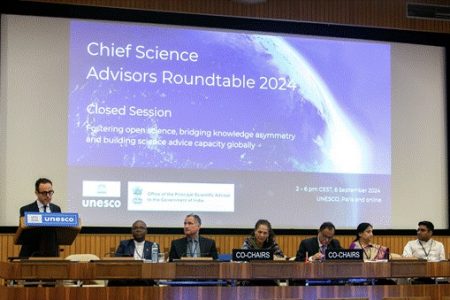Paris: The 2024 edition of the Chief Science Advisers Roundtable (CSAR) took place on September 6, 2024, at UNESCO’s headquarters in Paris, co-organized by the Office of the Principal Scientific Adviser to the Government of India and UNESCO’s Natural Sciences Sector. Launched during India’s G20 Presidency in 2023, the roundtable brought together chief science advisers and their counterparts from 29 countries and 8 international organizations to address the theme “Fostering open science, bridging knowledge asymmetry, and building science advice capacity globally.”
Co-chaired by Professor Ajay Kumar Sood, Principal Scientific Adviser to the Government of India, and Dr. Lidia Brito, UNESCO’s Assistant Director-General of the Natural Sciences Sector, the event emphasized the importance of partnerships in advancing global scientific initiatives. In her opening remarks, Dr. Brito highlighted how CSAR is now positioned within the International Decade of Sciences for Sustainable Development (2024–33). Prof. Sood underscored the need to bridge the gap between science and policy and to develop robust global systems for science advice.
Dr. Parvinder Maini, Scientific Secretary of the Office of the Principal Scientific Adviser to India, delivered a presentation on the nexus between open science, knowledge asymmetry, and science advice, while also updating the participants on progress made since CSAR 2023.
During the discussions, delegates shared insights into how science and technology are essential in tackling interconnected global challenges, particularly the dual role of disruptive technologies in knowledge creation and dissemination. The roundtable called for strengthened science advice mechanisms at national, regional, and global levels to aid decision-making processes.
A key highlight was the announcement by Dr. Mlungisi Cele, Head of South Africa’s National Advisory Council on Innovation (NACI), that South Africa will host CSAR 2025.
Countries represented at the roundtable included Australia, Brazil, Canada, Egypt, Germany, Japan, Russia, South Africa, and the United States. Several international organizations, such as the International Science Council (ISC) and the World Health Organization (WHO), also contributed to the dialogue.
The event was preceded by an open dialogue session focusing on the impact of science advice mechanisms in fostering trust in science globally. The keynote, delivered by Prof. Remi Quirion, Chair of the International Network for Government Science Advice (INGSA), emphasized the need for scientific literacy, science diplomacy, and open access to knowledge.
A panel discussion followed, featuring prominent scientists and advisers, including Prof. Maria Chiara Carrozza, President of the Italian National Research Council, and Sir Peter Gluckman, President of the International Science Council. The dialogue underscored the pivotal role that science advice plays in shaping informed policies and strengthening public trust in scientific endeavors.

